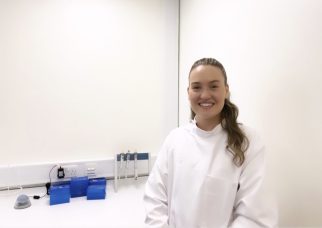Identifying Novel Druggable Targets in High Grade Serous Ovarian Cancer

Ellen Treacy
Ovarian cancer is the most lethal gynaecological malignancy, with ~300,000 women diagnosed each year worldwide and over 360 women in Ireland. Ovarian cancer is the 4th most common female cancer in Ireland and ~270 women lose their lives each year.
Ovarian cancer is typically diagnosed at a late stage, with 80% presenting at an advanced stage. Treatment involves surgery and chemotherapy. For 70% of patients, the cancer returns, and the patient receives chemotherapy again. Eventually, chemotherapy stops killing the cancer cells and this is called ‘drug resistance.’ These patients then face treatment options with chemotherapy drugs with very poor success rates.
There is a huge clinical need to introduce targeted therapies to improve survival outcomes for patients diagnosed with ovarian cancer. For this reason, we need to find new treatments for these patients that develop drug resistance. We found that drug-resistant ovarian cancer cells grow slower when we treat them with drugs that block a protein from working. We have shown higher levels of this protein in tumour biopsies from ovarian cancer patients.
To get closer to the clinic, we plan to do further tests using ovarian cancer cells in animal studies to determine whether using drugs that block this and another protein from working could reduce tumour masses. We already have some understanding of how this protein is working in ovarian cancer but we need to know more as we believe that this knowledge could potentially open up other cancer pathways to target in ovarian cancer.
Back








 Contact
Contact